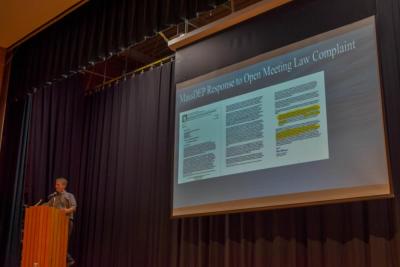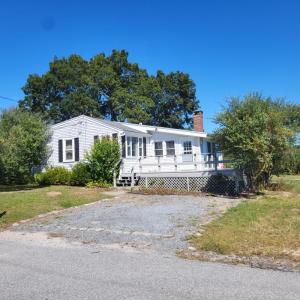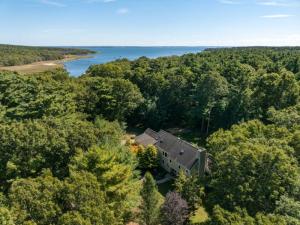Public health director urges state to re-examine commercial composting as major watershed pollutant
Dartmouth Public Health Agent Chris Michaud is calling on the Massachusetts Department of Environmental Protection to re-examine sources of nitrogen pollution into Buzzards Bay.
Namely, he wants the department to focus on commercial composting — something he said has nitrogen discharges that are “off the charts” when compared to wastewater, which is the state’s primary focus at this time.
“The people want common sense here,” Michaud said at an informational session on the proposed regulation changes held Feb. 23 at Dartmouth Middle School.
In a statement to Dartmouth Week, a MassDEP spokesperson said the department is “committed to engaging with communities and integrating feedback” into any updates to its septic regulations and that state officials “are examining commercial composting as a possible contributing factor.”
“We share a common goal of properly measuring and regulating all significant controllable sources of nitrogen,” he said.
The state is currently proposing residents living along estuaries connected to Buzzards Bay replace their septic systems with ones containing nitrogen-filtering technology as part of an effort to decrease pollutants in the region’s waterways.
The proposal has generated significant pushback from Dartmouth officials.
Proponents argue that revising the regulations is the best way to ensure clean waters. But local officials are skeptical that targeting wastewater is the most efficient way to combat pollution.
According to the state, 29% of nitrogen entering the Slocum River comes from wastewater. For the Westport River, septic tanks accounted for 23% of total nitrogen pollution.
Michaud, meanwhile, says testing conducted by the town shows that commercial composting— an industry that is regulated by the state — is by far the larger polluter.
According to the Dartmouth health agent, testing at one site found around 3,000 mg per liter of nitrogen in the groundwater in 2018.
The state had reported a nitrogen concentration of 0.64 mg per liter coming from septic into the Slocum River, according to a 2019 report on water quality in the estuary.
Many of these composting facilities have channels that run directly into salt marshes and other estuaries, according to satellite photos. A pond close to one of the town’s commercial composting sites had a reported nitrogen concentration of 1.42 mg per liter, Michaud said — more than twice the discharge of on-site septic.
“It’s an environmental tragedy and it’s a public health malpractice by DEP to be continuing on with their regulations that are allowing composting to go on in the backwoods of these communities,” Michaud said.
When asked by town officials why it has not focused on composting, MassDEP said it is considered “part of normal agricultural land use” and was therefore “included intrinsically” in its data collection, which occurred between 2000 and 2006.
“These composting facilities represent new nitrogen loads that did not exist during the initial study period, therefore the town still has to address the impacts from the baseline conditions outlined in the original [Massachusetts Estuaries Project] report,” the department wrote. MassDEP could not be reached for comment on if it would reconsider composting as part of its efforts to reduce nitrogen.
For more information on Michaud’s compost findings, visit the DCTV YouTube channel at www.youtube.com/watch?v=iUG9JbGTw9w.
Should the state’s changes take effect, there are around 2,700 homes in Dartmouth that would be affected by the new regulations, according to MassDEP. This number could increase, as Michaud noted that the state is testing the waters around Apponagansett Bay.
New nitrogen-filtering systems can cost up to $50,000 per installation with an annual maintenance fee of $1,000 to $2,000, Dartmouth officials have warned.
To help alleviate the cost of those potential upgrades, Dartmouth’s representatives to Beacon Hill, State Sen. Mark Montigny (D-New Bedford) and State Rep. Chris Markey (D-Dartmouth) filed legislation last month that would prevent MassDEP from imposing these upgrades unless it is part of a watershed permit requested by the town. It would also require the state to help fund the upgraded systems.
State Rep. Paul Schmid (D-Westport) has also sponsored the legislation. The bill has yet to be taken into consideration.
The other option, according to the state’s proposal, is to have towns apply for a “watershed permit” which would allow municipalities to develop their own state-approved plans to reduce nitrogen by 75% over 20 years.
This route, Michaud said, would also be a costly endeavor for residents as it would require the town to invest in expanding its sewer system, along with capacity at existing facilities.
Permits would also require the town to enter into agreements with communities that share these watersheds to tackle nitrogen pollution together. In this case, Westport and New Bedford — municipalities Michaud said have “vastly different” influences.
“Why would New Bedford want to do a watershed permit for Padanaram?” Michaud said. “That would be suicide for them.”
Thursday's meeting also consisted of correspondence between MassDEP and the Town of Dartmouth over the ongoing issue.
This includes the state’s response to the Open Meeting Law violation filed by the town in January.
Local officials have claimed lack of transparency from MassDEP. In particular, they have voiced displeasure that membership of the Nitrogen Sensitive Area stakeholders subcommittee, which was responsible for recommending the changes, was not easily accessible to the public.
In response, MassDEP said the subcommittee was an “informal group” created to assist the department and was thus not subject to the state’s open meeting laws.
Public comment on the proposed regulation changes closed on Jan. 30, but residents can contact Gary Moran, the deputy commissioner of the Massachusetts Department of Environmental Protection, via email at Gary.Moran@mass.gov to weigh in on the ongoing septic issue.
Additionally, residents can contact Rebecca Tepper, the Secretary of the Executive Office of Energy and Environmental Affairs, at Rebecca.L.Tepper@mass.gov.
Residents can also contact the governor’s constituency office by calling (617) 725-4005 or (888) 870-7770, or by visiting www.mass.gov/governors-office-of-constituent-services.
“If you’re concerned about this as [much as] I am, reach out and maybe we can get the attention of these people for a better redo,” Michaud said.
































